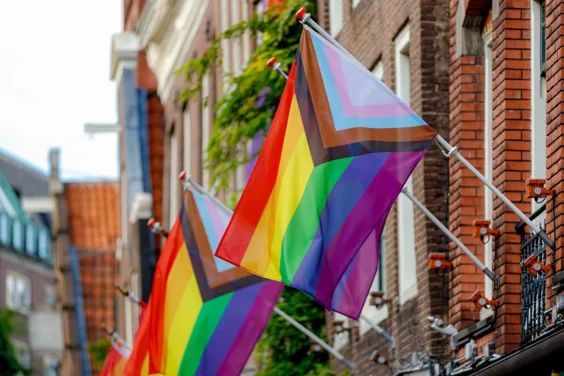This glossary of terms is part of Guidelines for entertainment professionals working with LGBT+ performers.
Glossary of terms
Assigned Female at Birth. Assigned Male at Birth.
A person who has both "masculine" and "feminine" qualities.
A person who supports or advocates for LGBT+ people.
A term for people whose gender identity matches the sex that they were assigned at birth.
A term typically used to refer to men who occasionally wear clothes, makeup and accessories culturally associated with women. Tends to be a form of gender expression, cross-dressers do not usually wish to change their sex or live full-time as women. This term replaces the old word, "transvestite", but it may still be used by individuals.
The name given to a trans person at birth, which they often change during transition.
The performance of gender — masculinity, femininity or other forms of gender expression.
Female to Male, or Male to Female.
The feeling of discomfort or distress that might occur in people, whose gender identity differs from the sex they were assigned at birth.
External manifestations of gender, expressed through a person's name, pronouns, clothing, haircut, behaviour, voice, physical mannerisms, body characteristics.
A person's gender identity is their internal sense of themselves as male, female, or another gender.
A range of gender identities between and outside of the traditional categories of male and female.
A person who doesn't confine themselves to one gender. May fluctuate between masculine, feminine, neither or both.
Describes those whose gender expression is different from conventional expectations of masculinity and femininity.
People who experience their gender identity as outside the traditional definitions of male or female. They may identify somewhere in between man and woman or they may define it as wholly different from these terms. Sometimes shortened to enby. Other terms include genderqueer, agender, bigender, pangender, and more. None of these terms mean exactly the same thing – but all speak to an experience of gender that is not simply male or female. Allow individuals to define their gender.
Fear, hatred, intolerance and discrimination of gay, bisexual, or lesbian people.
An umbrella term describing people whose reproductive, sexual anatomy and/or hormonal/chromosomal patterns differ from the cultural stereotype of what constitute typical male and female. Also called VSC — Variations of Sex Characteristics.
When someone uses the wrong pronoun or term to refer to a person.
Out refers to someone who self-identifies as LGBT+ in their personal, public and/or professional life. Outing is the act of disclosing an LGBT+ person's sexual orientation or gender identity without that person's consent. Always check that someone is out before you pass on this information.
The ability of an LGBT+ person to go out in society and be assumed to be straight/cisgender based on what our perceptions of these terms mean. Individuals will have different opinions on how important this is to them. Used among the LGBT+ community, rather than by cis/heterosexual people themselves.
How a person wishes to be referred to if, for example, they are not in the room. Usually She/Her, He/Him, They/Them, or their name (also xe/ze/hir/hirs, which are gender neutral pronouns. Less common).
Once considered a pejorative term, queer has been reclaimed by some LGBT+ people to describe themselves, though it is not universally accepted as such. It describes sexual or gender identities, relationships or lifestyles which are not wholly heterosexual or typical of society's "normal". It's a term which stands outside of Gay, Lesbian, Bisexual identities, which queer people feel are too limiting and/or fraught with cultural connotations which don't apply to them. An umbrella term.
Denoting or relating to a person whose sense of personal identity and gender does not correspond with their sex assigned at birth.
The process of changing one's gender presentation and/or sex characteristics to accord with one's internal sense of gender identity The steps involved in transitioning vary from person to person. Transition can include some or all of the following: personal, social, medical, legal. It may or may not involve using a different name and pronouns, dressing differently, changing legal documents, hormone therapy, and possibly (but certainly not always) one or more types of surgery.
An outdated term originated in the medical profession to refer to trans folk who change — or seek to change — their bodies through medical procedures. Still used by some older members of the community, but has largely been replaced by "transgender". It's being claimed back by some people. Allow individuals to tell you if they identify this way, but avoid using it widely.
Negative feelings, attitudes or actions towards transgender people.
Sexuality identities
A woman who is attracted to other women.
A person who is attracted to people of the same sex. Can apply to males or females.
Somebody who is attracted, physically and romantically to persons of both male and female gender.
Used to describe people who do not feel sexual attraction.
A person who has the capacity to form physical/romantic attractions to any person, regardless of their gender identity or sexuality.
Being attracted to people of one's own sex.
People whose physical and/or romantic attraction is to people of the opposite sex. (also "Straight")

